Ex-commercial angler: North Carolina needs to chart new saltwater course
“All this water in North Carolina belongs to the people of North Carolina, not just to the people on the coast. We don’t own one tablespoon of this water; it belongs to all of us, every citizen of this state.” * Charlie Brown, former commercial fisherman and owner of Old Core Sound Guide Service. By Craig Holt
Charles Brown of Gloucester hails from a fifth-generation Down East fishing family, and proudly proclaims “I’ve done it all.”
“All” includes dredging for shrimp and oysters, crabbing, setting gill and pound nets for flounder and working as a deckhand on an ocean-going scallop boat. He also worked 18 months as a handyman for the National Park Service at Core Banks until a freak accident in 2000 nearly killed him. He’s also been a waterfowl guide, like his father, grandfather. uncles and great uncles.
Brown is as Down East as you can get, a true “hoi-toider” whose speech is peppered with distinctive Elizabethan inflections that convert “i” sounds into “oi.”
At 6-3, 220 pounds, his body is rock hard, with arms wrapped in muscles like tether ropes for tugboats and hands calloused by uncounted days of pulling nets.
Now 51, he was a commercial fisherman for most of his life because that’s the culture he was born into and that nurtured him — until 2009.
“I stopped ’cause I saw the writin’ on the wall,” he said recently.
What Brown saw in a 1,000-yard stare gained by years of studying the waters of Core and Pamlico Sounds was a collapsing marine environment and disappearing fish stocks.
“I’ve been on both sides of each user group,” he said. “But we’ve let one user group run wild and call the shots for so long, right now you can’t make a decent living. And that means you can’t pay your bills, put your kids through college, and you can’t have what you want.
“Most of all, there’s nobody there for the resource.” Brown said the situation started turning for the worse 30 years ago.
“It was 1980,” he said. “When I was young, I used to long-haul shrimp, trawl for crabs, set crab pots, clam and flounder fish off the beaches. It was good.
“One old feller who owned a fish house, he would look at me and say, ‘It’ll never die; it’ll always replenish itself’ — but he was wrong.”
New improved commercial gear and too many people taking their livings from a free, public resource started saltwater finfish and shellfish on a downward spiral.
“One of (the old) guy’s commercial men used to gig 400 pounds of flounder a night, every night,” Brown said, “Then he went to nets — gill and pound nets.”
Not only that, but inland residents who loved flounder soon discovered they could drive to the coast towing a flat-bottom skiff and gig flatfish or purchase a small-car battery set in a Styrofoam float or in a backpack, wade the shallows and stick all the flounder they wanted — plus extra doormats to feed their friends and neighbors. Many flounder also ended up iced down at inland fish houses or sold at road-side stands.
Brown pointed to one of his uncles who used a skiff with a deep-cycle battery, light pole and steel gig to go floundering. “It was nothing for him to bring in 300 to 500 pounds of flounder a night,” he said.
“What fish could stand that type of pressure?”
Of course, this situation caused consternation among commercial giggers.
Pretty soon the N.C. Marine Fisheries Commission and N.C. Division of Marine Fisheries decided recreational anglers who used the same equipment as commercial fishermen, including gigs, had to purchase a Recreational Commercial Gear License. If a recreational angler used a gig for flounder, he had to drop back to recreational limits. The rule, in effect, helped commercial giggers – it left more flounder for them to gig – or it forced former recreational giggers to become commercial giggers. “Big mistake,” Brown said. “They never shoulda done that.”
When the NCDMF declared southern flounder overfished and size limits for recreational anglers were raised so high that legal-size flounder in the Pamlico and Albemarle sounds became as rare as a Republican legislator getting a donation from the teachers’ union, netters turned to other, more abundant species.
“Now we don’t have spot runs like we used to, and the croakers are gone,” Brown said. “I used to long-haul spot and croakers, and we’d come back with 1,000 boxes of each. You don’t get that no more.”
It’s not that Brown blames commercial fishing for doing what it could to land fish, but he believes the political influence of commercial fishing on the N.C. Marine Fisheries Commission has led that agency to overlook the devastating effect of increasingly effective gear on targeted fish populations.
He longs for the old days when a few people could make a decent living, catch plenty of fish, yet there’d still be enough to ensure their survival.
“When I was young, we used to go mullet fishing with my Uncle Gordon and my granddaddy,” he said. “We used 16-foot push-pole boats, do it at night and hang lanterns up. We used nylon, monofilament nets, and real cork floats. A good night we’d get 100 boxes of mullet, but plenty of mullet would escape.
“Right now there’s so much equipment, and the technology’s gone so far, the fish ain’t got a chance. Nothing can escape from the bottom (of the nets). Some of them stand up in 15 feet of water.”
Brown said no one Down East saw flounder gill nets until 1980.
“We used gigs and pound nets,” he said.
Now gill-netting for flounder is a preferred inshore method.
Spotted seatrout pressure by commercials is even tougher on those fish, declared overfished by the NCDMF several years ago.
Some of it came from Florida, where strike-netting for mullet was ended by a 1994 statewide inshore ban on gill nets. Quite a few Sunshine State netters moved to North Carolina where they could do what they wanted. Local netters adopted strike-net techniques to land other species, particularly spotted seatrout.
“Say you got a narrow creek, 30- to 50-feet wide,” Brown said. “They set a net right down the middle, snaking back and forth, then they tie a cinder block to a rope and drag it next to the shore to scare the specks out to the middle. That’s where they get caught in the nets.”
Brown said he revealed this problem — which occurs in winter when specks go into a creek headwaters looking for warmer water and July and August when they go shallow to spawn — to the NCMFC’s Spotted Seatrout Advisory Committee.
“They said, ‘No, we can’t stop that,’ ” he said with disgust.
Brown’s experience and knowledge of fishing techniques has given him some ideas about how to solve some of these overharvesting problems.
“First, (NCDMF) could put those shallow creeks off-limits to everyone a couple of winter months and in July and August, or allow catch-and-release only rec fishing and no strike-netting those months,” he said. “If a rec gets caught those months with five or six specks in his cooler, it’s $100 fine for each fish. That’d break his heart and his pocketbook. If a netter got caught (in an off-limits creek), take his boat and his nets.
“I guarantee that’d stop this stuff.”
As for NCDMF’s revelation that 10 percent of specks die from deep-hooking, Brown said there’s a simple solution.
“Most of the fish (deep-hooked) are ‘squealers’ (under-size trout) that swallow Gulp! baits, not big trout or fish that bite shrimp baits,” he said. “What’s keeping MFC from making a rule you have to use barbless hooks? They do it with mountain trout, so why not coastal trout?”
As for red drum, Brown said he wouldn’t target specific dealers, but he said something obviously is amiss, with North Carolina supplying 90 percent of the nation’s red drum for consumption but having a 250,000-pound annual cap.
“Somebody needs to look at how many trip tickets (for red drum) and the poundages come into (a fish house) and the trip tickets (poundages) written for Marine Fisheries that go out the door,” he said. “I’ll just say a lot of those (netters) are paid in cash, and if a (gamefish-status) bill goes through, it has a 3-year (compensation) for netters. But they’ll have to produce trip tickets to get that money. And I think that’s probably a reason why they don’t want this bill.”
Brown said it might sound like he’s anti-commercial fishing, but that’s not the case.
“I’m for commercial fishing,” he said. “I was born into it. But we’ve lost the conservation part and aren’t putting anything back. The recreational guys have backed down and backed down, going with the flow. But the commercial guys never back down; they want more and more.
“No one’s in the middle for the poor fish.”
Brown said he wishes his commercial fishing compadres had more concern for the resource and not immediate monetary gains.
“When I went into (guiding), I found it’s a better living; it’s a lot easier; and a lot more fun if you’re a people person,” he said.
“I’m a people person; I enjoy people.”
He also said he would help ex-commercial anglers become guides and already has done so for a handful of his friends. If changes occur in gamefish management, he said there’d be enough fish for everyone.
“Commercial fishermen would be the best guides you ever saw,” he said.
Mainly though, Brown believes his occupation is better for coastal resources, and he thinks measures can be taken — if the state’s legislators have the courage to ignore then remove political influences from marine fisheries management — to bring back his beloved sounds to near what they once were.
“Down here, Core and Pamlico Sounds are diamonds,” he said. “To us they are the most valuable things in the state of North Carolina.
“I’ve talked to guides from Louisiana, and they told me if we managed our fish the right way, we could blow them out of the water, because we’ve got the water and habitat to do it. People would come from other states to fish here, and people from here would stay instead of going to South Carolina, Louisiana, Mississippi or Florida.
“We’ve just got to stop somewhere, throw the brakes on and turn this whole thing around.”
skip to main |
skip to sidebar

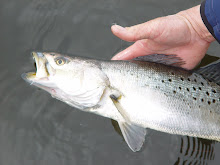



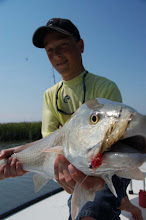
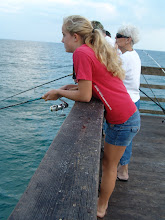

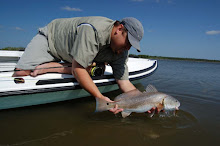.jpg)


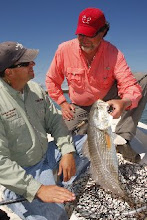
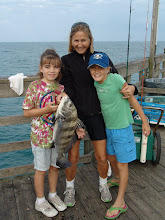



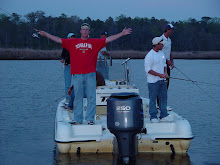
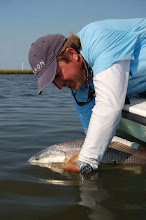
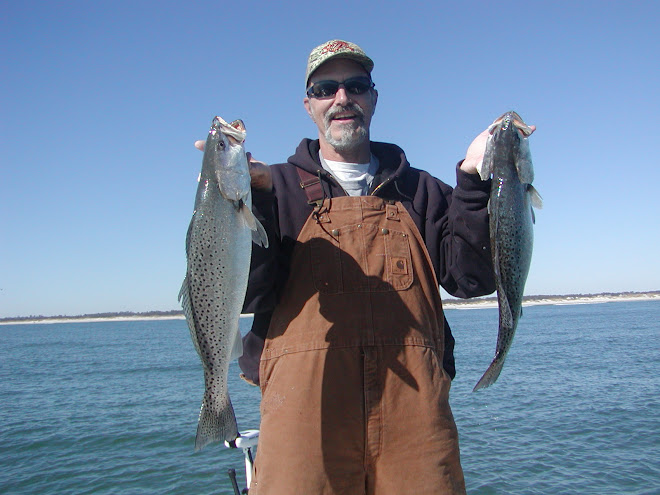

Number of visitors since 1/15/2009
Go to the Game Fish Website here....


FEEDJIT Live Traffic Feed
Contact Us
To be added to our email list, please send us your full name, the town/city where you live, and a contact phone # to CFRG@northstate.net

Blog Archive
-
▼
2012
(20)
-
▼
January
(6)
- "Visiting" fishermen say Gamefish Protection would...
- Interview with NCDMF Director Dr. Louis Daniel: On...
- Ex-commercial angler: North Carolina needs to char...
- Fisheries Decisions Have Broad Economic Consequences
- Joe Albea: On the Record with NC Sportsman about t...
- A Must Read Article by Craig Holt of NC Sportsman ...
-
▼
January
(6)

Dolphin killed by NC Gill Net

Followers

About Us

- CFRG Admin
- The CFRG believes in: *Science Based Fisheries Management. *Banning of Destructive Fishing Gear. *Game Fish Status for Speckled Trout, Red Drum, and Striped Bass.
.jpg)









